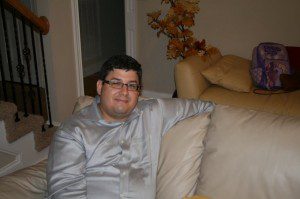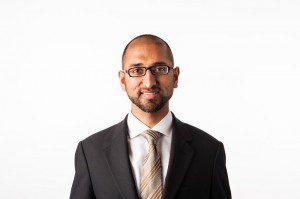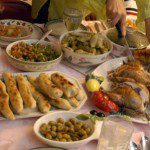
Interview by Dilshad D. Ali
Father’s Day has come and gone, but the evolving relationship between fathers and children is timeless. Once upon a time — a generation or two ago — the norm (more or less) was for a man to have children and be their father in a big-picture kind of way, leaving the intimate details of parenting to the mothers. Perhaps more so in Muslim circles, this was the parental order of things. But not so much anymore.
The role of fathers has evolved to become more hands on, and is now more crucial than ever in the raising of future generations. And, as many of the men featured in the new anthology, Salaam, Love write, the relationship displayed between a mother and a father are especially influential upon their children.
Altmuslim recently spoke with Alan Howard and Khizer Husain, both contributors to Salaam, Love, about love, spousal relationships, their dreams for their children. About what makes a man a father and how important it is to demonstrate love in front of children. Alan, who lost his wife two years ago, is raising his son. Khizer and his wife have struggled with infertility for a number of years.
In Salaam, Love, all three of you write about your love stories – what do you want your children to know of your love story?
Alan Howard: My story was about loss, but it was also about love taking time. I want to convey that a person can love, and they can lose their loved one — whether through death or some other situation — but that doesn’t mean that the love is gone or over. It’s important to point out, especially for me, that loss did not equal the loss of the love that was in our [marital] relationship.
To my son, what I would want to convey (and has been conveyed) is that he is always surrounded by love. He witnessed my wife’s illness and her passing, and he witnessed my taking care of her. He witnessed the physical act of love. I want to make sure he understands that despite the loss of his mother, he is always surrounded by love.
Khizer Husain: – Love and trust is the foundation of a relationship. When you embark on a relationship like marriage, I think it’s really important to realize you’ll dream together, but some things don’t pan out. I remember after we got married, [my wife Zuleqa] moved to the states after she got her visa. Then after two months of working, I got laid off. But because we had that trust and love, it was so easy to go to the next phase and kind of absorb that shock.
When it came to our infertility, it was a shock and a blow, but it was something we were embarking on together. And because the loneliness factor wasn’t there, I would say for me, it was a setback in this journey, but not something that derailed us.
You’ll always have conflict in the relationship, but if you’re not actively managing those, these things can push you off the precipice. This relates to our relationships with youth in our community or our relationship with our nephews and nieces. I’ve paid more attention to those relationships. I’ve tried to be a coach, to offer another perspective and to be able to play that parental role as need be.
Should one work through conflict in front of children?
AH: I think it’s super important to be open. At the end of the day if there’s tension in a relationship, you can try and hide it, but it’s going to get out in the open. In my case, with a fatal illness there was absolutely no way to hide it. The chemotherapy, the hair loss, the sickness — it’s just so in your face.
It’s not a martyr mission either; in that during the time she was sick, we had a normal relationship. We had arguments in front of our son. It was all out in the open. The only exception was things that were very traumatic, like when we discussed with the doctor how long she would live and discussions of will and testament and what we do when she passed. We never discussed those things in front of our son.

KH: I think it’s healthy to work through conflict in front of children. I think that’s normal and a good model. Good conflict resolution. I do think that when it involves talking about others, particularly other family members, that I don’t think should be shared in front of children. I don’t think kids need to know there are these entanglements from time to time.
AH: As your kids get older, they begin to realize the adults in their lives aren’t demigods, that they’re humans. With my situation, my son has seen so much and has seen the stress that comes with it, from his grandmothers on both sides. So I agree to keep [family] conflict away from the kids, but it’s interesting that kids sometimes can’t help but see what is around them.
How do you want love to come for your children or Muslim children in general?
AH: For me it’s a little different. When I met my wife, I wasn’t even a Muslim and neither was she. The conversion took place after. I met my wife at a conference, and we started talking and then things naturally happened. I wasn’t doing the dating scene or the bar scene. I think that worked out really well, and I would hope my son would get the same opportunity. Obviously he’s being raised Muslim, and there are some caveats around it. I would hope he would meet someone himself.
KH: I would be thrilled if my kid or any of the kids I know would have this ramp-up that Zuleqa and I had. Our process was phenomenal. It was the ability to have the proper due diligence, but have anything protracted. There was never, from the outset, any question of what our motives were. That was something Zuleqa asked from day one. I had actually met her parents before I even met her. I learned that it doesn’t necessarily have to be you seeing this person every single day for months. It can be other people you trust pulling in data from different angles.
I see value in due diligence, but there is a danger in [casual] dating. I think we as an American Muslim community are figuring that out.
What would you teach your kids about dating? How does one teach children to “date with good intention” rather than casually and just for fun?
KH: With dating – what’s the proper age? Is it high school? I would hope not. There are so many questions. Are you really trying to figure out if this person is right for you for the sake of marriage, or is it just for the sake of a good time? And if so, then a lot of gray areas come in. You can quickly come to a position that is just not healthy for either of you. I would want to avoid those of situations for my kids.
AH: You have to have a certain level of emotional maturity to date, which sadly even the adults in our society don’t seem to have. High School is not the time to be dating because you’re not fully developed in your thinking process. But, at the same time we need to have a vehicle for our youth to start meeting people.
Do you think love and fatherly parenting are too absent from our faith narratives?
AH: I don’t think it’s absent. Maybe it’s not mentioned because it’s almost encompassing in our Islamic traditions. Regardless of how we want to argue it, I don’t think Islam is set up this way, but it’s become patriarchal. It’s good that the Quran and the hadith have passages that honor women and talk about their equality. But there’s almost a super-narrative about the man being responsible and supposing to be in charge. It’s sort of super-imposed. So the reason you may not hear about the role of the father is that it’s assumed.
It seems parenting is a little murkier between mothers and fathers in Islam now – roles more blurred.
AH: I think it’s good that things are murkier. Women used to stay home and take care of the baby and husbands went off and worked. But me, when my son was born, I took a month off and just stayed at home with him, read to him and played with him. I took on a lot of roles that are nontraditional, and of course now I’m the mother and the father. And I think it’s good for my son to see this – he sees my career and how hard I work and that home life is important as well.
If you look at some of the stories of the Prophet Muhammad (saw) and the sahaba (companions), there was a lot more of this blending of roles. Over the centuries things have become very rigid with division of labors. But now it’s much better — It’s like we’re getting back to that[time of the Prophet when] nobody has a set role. We do what we have to do for our kids.
Khizer Husain is an Education Pioneers Fellow at Two Rivers Public Charter School. In his spare time, he writes and publishes children’s stories for FarFaria. He lives with his wife in the D.C. Metro area.
Alan Howard is an Operations Manager with Cisco Systems out of Atlanta GA. He is heavily involved in interfaith dialogue work and community activism. He enjoys hiking, kayaking and international travel.












